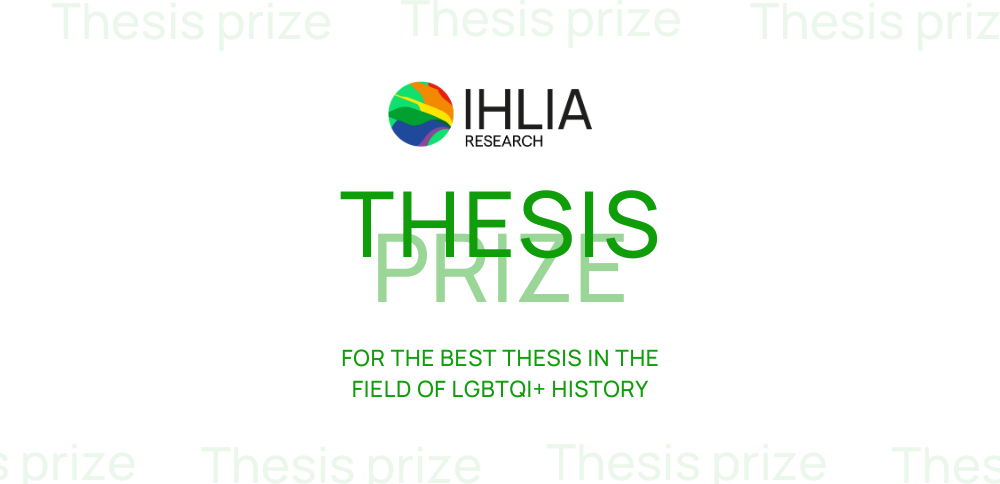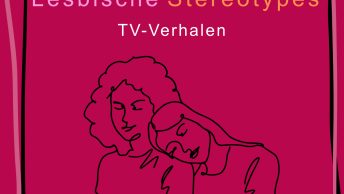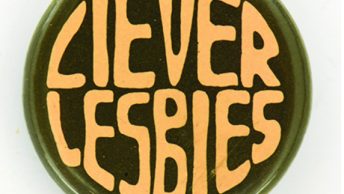The presentation of the biennial thesis award for LGBTQI+ history will take place in Amsterdam on 21 March.
Every year, dozens of students at universities write a thesis on a subject in the field of LGBTQI+ history. Unfortunately, much of this material disappears into the proverbial drawer. That is a pity, of course. To make this research more visible and to reward it, IHLIA presents a biannual thesis prize for the best LGBTQI+ historical thesis in Flanders and the Netherlands.
Nominees
From the 17 theses submitted, the expert jury, consisting of Geertje Mak, professor of the Political History of Gender at the University of Amsterdam, freelance historian Alex Bakker, Mariecke van den Berg, professor by special appointment of Feminism and Christianity (Radboud University) and Jonas Roelens, postdoctoral researcher at Ghent University, chose a top four.
Selected are:
Grensverleggende zorg: Ervaringen van Vlaamse transgender personen met medische zorg, 1950 tot heden. – Esther Lamberts (KU Leuven)
This thesis focuses on the experiences of transgender persons in Flanders with the research question: “How was the development of transgender medical care experienced by trans persons themselves, in Flanders from 1950 to the present?”.
By paying attention to trans people’s experiences and starting from a bottom-up perspective, agency is brought into focus, thereby questioning the dominant top-down narrative.
With this focus, this thesis fulfils pioneering work not only for the Flemish case, but also internationally. The substantive focus on the ways in which trans persons themselves dealt with, and attributed meaning to, the emergence of medical assistance also complemented existing international historiography.
The Impact of LG(BT) Activists with Religious Affinity on LG(BT) Emancipation and Religion in the Netherlands (1978-2001). – Leonie Paauwe (Universiteit Utrecht)
Research covering the historical interaction between religion and sexual diversity tends to focus on religion as a top-down repressive force in the first half of the twentieth century and underlining secularisation in the second half, hereby either assigning a negative role to religion or disconnecting religion from emancipatory success.
Although multiple religious gay/lesbian activist collectives appeared from the seventies onwards and suggest that religion was a topic in gay/lesbian emancipation, the existing literature still lacks an in-depth analysis of how religion and emancipation movements interacted, grappled, clashed and interlaced on various occasions.
This historiographical hiatus strengthens a since the 1990s popularised political narrative, otherwise known as sexual nationalism, which paints religion as the enemy of LGBTQIA+ rights today. This study provides a nuance to this narrative by investigating the impact of LG(BT) activists that had affinity with Christianity, Judaism and Islam on the LG(BT) emancipation movement and religious environments.
By queering Mary Louise Pratt’s lens of the contact zone it takes the first step to write religion back into the history of sexuality and sexuality back into the history of religion and modernisation.
Van crimen nefandum naar homosexualiteit: het publieke debat over homoseksualiteit in Nederland tussen 1911 en 1940. – Aimée Tio (Universiteit Leiden)
This thesis examines the public debate on homosexuality between 1911 and 1940 in the light of gay emancipation in the Netherlands. With a special focus on the public discourse on homosexuality in newspapers – not previously done on this scale – an attempt has been made to gain new insights into the role public debate played in the discussability and emancipation of homosexuals in the Netherlands.
Moreover, by including the concept of pillarisation in this study, unlike historians and other writers in the past, an attempt has been made to add nuance to the current narrative about the public debate on homosexuality in the Netherlands.
Descendants of Sodom: A History of Pleasure in Lima (1950-1982). – Diego Galdo-González (Universiteit van Amsterdam)
Descendants of Sodom examines the quest of maricones (fairies) for pleasure in Lima, Peru between the early 1950s and 1982. Countless people crossed the path of maricones as they strolled through the city – including their male partners and cis-wives – but this thesis focuses mainly on the character of the maricón.
Based on twenty-three life history interviews with 13 maricones and dozens of untapped archival sources, this dissertation traces their trajectories over three decades.
Descendants of Sodom follows the thread of fun and explores the ways in which they created mariconizaron (mariconised) public space, a semi-public ambiente, and locked it within the walls of marica-only commercial venues in the space of a generation.
Digging into the past
The award ceremony falls in the annual Dutch Queer History Month (site is in Dutch) and is complemented by a content programme in which researchers dig into a queer past.
Speaking will be Michiel Teeuw, who is conducting a multidisciplinary research and art project on the monster trial of Faan (1731), where 21 men were sentenced to death, strangled and burned. They were persecuted for sodomy, or homosexuality; and Alex Bakker who is committed to preserving the grave of trans pioneer Aaïcha Bergamin (site is in Dutch), who underwent gender-affirming surgery in the early 1970s and was one of the first and few to have the gender on her passport changed in 1973.
DIGGING INTO THE PAST – AWARD CEREMONY IHLIA THESIS PRIZE
When? 21 March
Time? 17.30 – 19.30 hrs
Where? Tolhuistuin (IJzaal); IJpromenade 2 | 1031 KT Amsterdam
Entrance: free (limited number of places available). Register via aanmelden@ihlia.nl)









